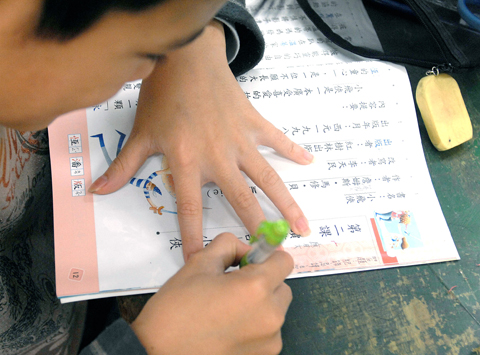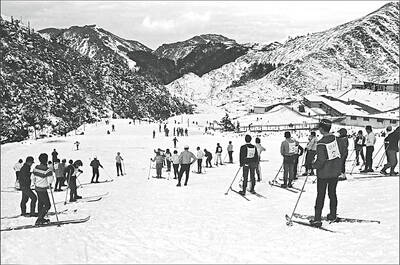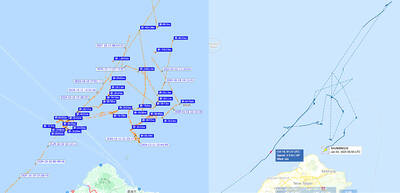When Taiwanese academic Shih Cheng-feng (施正鋒) was a boy, he was forced to speak a language that was not his own, and four decades later he still feels handicapped by his education.
He grew up under a regime that had fled China and now wanted him and everyone else to speak the dominant language of the mainland, with the right Beijing accent.
This included a difficult sound not common on the island that involves rolling up the tongue, and students who lapsed into their native Taiwanese were humiliated with a tag saying: “I’m no good. I speak dialect.”

PHOTO: PATRICK LIN, AFP
“Sometimes people have only developed their Taiwanese to elementary-school level,” said Shih, now a 52-year-old political scientist at National Dong Hwa University in Hualien.
“They don’t know the academic terms, even if they want to use them … We lost values, traditional wisdom, everything,” he said.
Millions of Taiwanese have the same experience as Shih, meaning that the country today is left with a complex linguistic legacy that determines its fate in numerous ways — but has also meant some advantages.
The ability to speak Mandarin means Taiwanese can, without difficulty, communicate with all 1.3 billion people in China, taking advantage of the startling economic boom over the past three decades.
“Taiwanese can do business much more easily than Hong Kong people because Chinese find it’s much easier to communicate with [Taiwanese],” said Wang Horng-luen (汪宏倫), a sociologist at Academia Sinica.
The Cantonese language is dominant in Hong Kong.
“Many Chinese people say Taiwanese people speak Chinese even better than they do themselves. There are many dialects in China, so many people speak Mandarin, but do it with a very strong accent,” he said.
Language may have been the single most important factor in allowing Taiwan to latch onto the Chinese juggernaut, with Taiwanese investors placing more than US$100 billion in China.
However, this has come at a steep cost, as many of Taiwan’s 23 million people have limited ability to speak the languages native to Taiwan for centuries.
At home, most speak Hoklo (also known as Taiwanese), which came to Taiwan with immigrants from China as long as 300 years ago.
Millions of others speak Hakka, another language imported from China, or one of numerous Austronesian languages that have nothing to do with Chinese.
“The justification for imposing Mandarin was to unify people with the same language, but there was a hidden agenda,” Shih said.
“If you want to crush people, you should deprive them of their history, their culture, their language,” Shih said.
The Chinese Nationalist Party (KMT) took over Taiwan from a defeated Japan in 1945, immediately striving to revive a Chinese consciousness among locals who had been under Japanese colonial rule for 50 years.
Although there might have been an economic rationale for teaching Mandarin in Taiwan, the main aim was political, said Jennifer Wei (魏美瑤), an academic at Soochow University in Taipei.
“The high-handed language policy in the 1950s and 1960s was not all for economic development, but had to do with the all encompassing efforts to keep a tight control of the people,” she said.
“If the Nationalists only had the economic development in mind, then they shouldn’t ban the use of Japanese,” Wei said.
Bruce Jacobs, a specialist on Taiwan at Australia’s Monash University, remembers visiting a local dissident’s house with a friend around 1980 and trying to speak to the dissident’s daughter in Taiwanese.
“My friend said she can’t speak it. At that time very educated parents would speak Mandarin at home. She was 11 at the time,” he said.
“Just like the British in India and the French in Algeria, the Nationalists pushed the colonial language,” he said.
Paradoxically, given the KMT government’s original aims, the Mandarin now in use in Taiwan may actually contribute to developing a special identity in the country.
This is because Taiwanese have no common language other than the Mandarin they all learned at school, Wang said.
“The Mandarin spoken and written in Taiwan is very different from the Mandarin in use in mainland China,” he said.
“When Taiwanese people nowadays try to distinguish themselves from people from the mainland, language serves as a cultural marker,” Wang said.

DEEPER REVIEW: After receiving 19 hospital reports of suspected food poisoning, the Taipei Department of Health applied for an epidemiological investigation A buffet restaurant in Taipei’s Xinyi District (信義) is to be fined NT$3 million (US$91,233) after it remained opened despite an order to suspend operations following reports that 32 people had been treated for suspected food poisoning, the Taipei Department of Health said yesterday. The health department said it on Tuesday received reports from hospitals of people who had suspected food poisoning symptoms, including nausea, vomiting, stomach pain and diarrhea, after they ate at an INPARADISE (饗饗) branch in Breeze Xinyi on Sunday and Monday. As more than six people who ate at the restaurant sought medical treatment, the department ordered the

A strong continental cold air mass and abundant moisture bringing snow to mountains 3,000m and higher over the past few days are a reminder that more than 60 years ago Taiwan had an outdoor ski resort that gradually disappeared in part due to climate change. On Oct. 24, 2021, the National Development Council posted a series of photographs on Facebook recounting the days when Taiwan had a ski resort on Hehuanshan (合歡山) in Nantou County. More than 60 years ago, when developing a branch of the Central Cross-Island Highway, the government discovered that Hehuanshan, with an elevation of more than 3,100m,

Taiwan’s population last year shrank further and births continued to decline to a yearly low, the Ministry of the Interior announced today. The ministry published the 2024 population demographics statistics, highlighting record lows in births and bringing attention to Taiwan’s aging population. The nation’s population last year stood at 23,400,220, a decrease of 20,222 individuals compared to 2023. Last year, there were 134,856 births, representing a crude birth rate of 5.76 per 1,000 people, a slight decline from 2023’s 135,571 births and 5.81 crude birth rate. This decrease of 715 births resulted in a new record low per the ministry’s data. Since 2016, which saw

SECURITY: To protect the nation’s Internet cables, the navy should use buoys marking waters within 50m of them as a restricted zone, a former navy squadron commander said A Chinese cargo ship repeatedly intruded into Taiwan’s contiguous and sovereign waters for three months before allegedly damaging an undersea Internet cable off Kaohsiung, a Liberty Times (sister paper of the Taipei Times) investigation revealed. Using publicly available information, the Liberty Times was able to reconstruct the Shunxing-39’s movements near Taiwan since Double Ten National Day last year. Taiwanese officials did not respond to the freighter’s intrusions until Friday last week, when the ship, registered in Cameroon and Tanzania, turned off its automatic identification system shortly before damage was inflicted to a key cable linking Taiwan to the rest of